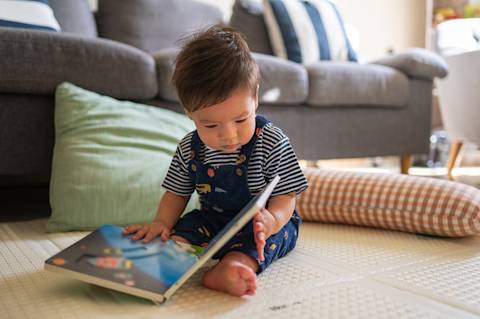In the first few months of welcoming your infant into the world, you spend so much of your time by their side making sure they have everything they need. As they get a little bit older, it can be difficult for your child to be away from you, leading to tears and tantrums. These strategies can help ease your child’s separation fear.

Babies and toddlers often become very attached to their primary caregivers and might fear new places or people. Most children experience some level of separation fear from 18 months to 3 years of age, but the level of fear varies a lot from child to child. It’s not the caregiver’s fault if their child experiences separation fear; it happens to many children!
When the tears and tantrums start, some caregivers feel guilty about leaving their child with another adult. And it’s OK to feel that way! But it’s also important to remember that there are many long-term benefits of children developing healthy, nurturing relationships with other adults outside of their caregivers. Safe, trusted relationships with adults help children develop their social and emotional skills, which will benefit them as they continue to build relationships throughout their life. Children learn that they can rely on adults to meet their needs, respond to them, and comfort them. It also helps them feel loved and important, which can increase their self-confidence.
If your child is overly upset when separated from you and/or your co-caregiver, here are some ways you can help ease their fears:
Infants: Separation anxiety can begin as early as 4 to 5 months of age, though it can be more common around 9 months. Making sure your child is fed and rested and making a speedy exit from the room are some of the best strategies for avoiding separation fear in infants and babies.
Toddlers: Some toddlers don’t show any separation fear, while others have a much more difficult time leaving primary caregivers. As children get older, they typically gain more independence, and separation fear can lessen over time. If your child faces separation fear, these ideas might help:
Prepare them in advance for what’s going to happen. Explain how exciting it will be to visit a new place or play with new friends. Part of children’s fear comes from not knowing what will happen, so preparing them for what to expect will help ease some of that fear.
Explain how long you’ll be gone in terms they understand. For example, you can try saying “I’ll be back before dinner” or “I’ll only be gone as long as two Paw Patrol episodes.”
Develop a speedy goodbye routine. It can be as simple as a warm hug and a wave goodbye. But keeping it short is the key to a smooth transition.
Practice separations by being apart for short periods of time. Next time you need to run errands, you can try having a trusted adult watch your child for 30 minutes to practice your preparation and goodbye routine. As they get more comfortable being away from you, you can try increasing the amount of time you’re gone.






